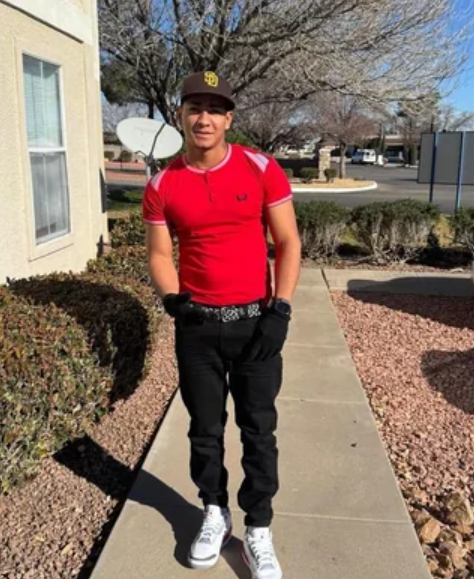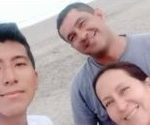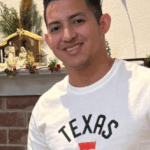Jesús entered the U.S. in July 2023 as an asylum seeker. He listed a Maryland address but stayed in Texas after meeting Angie. They were married in September 2024. A missed immigration court date put him on ICE’s radar, and he wore a GPS ankle bracelet. On February 1, while helping his wife with the laundry, he was arrested without warning—despite having a biometric appointment scheduled for the next day.
He was taken to a detention center in New Mexico, then transferred to El Paso and El Valle. On March 15, Jesús told Angie by phone that he believed he was being deported to Venezuela. After that call, he disappeared from ICE’s tracking system. In a phone call to one center, Angie overheard someone say he had been taken “to the ugly prison in El Salvador.” She confirmed his location only after seeing his name on a list published by CBS.
“I’m a U.S. citizen. I have the right to know where my husband is,” said Angie. In a letter to Congress, she denounced secret deportations and unjust detentions without proof of danger. “This isn’t just about him; it’s about human rights and due process.”
Jesús Alberto Ríos Andrade is married to a U.S. citizen. When he was detained on February 1 by immigration authorities, he had already started multiple U.S. immigration processes: permanent residency, a work permit, and even Temporary Protected Status.“ To begin with, my husband is not a gang member,” said Angie González, Ríos’ wife, who spoke to El Faro via telephone from El Paso, Texas. “He left home when he was 15 years old. He sold fruit on the street in Colombia and then sold accessories for phones. He learned to cut hair to get into barbershops and cleaned stoves in restaurants. Whatever he could get his hands on, he did,” González said. In the U.S. he was working in construction. Angie told El Faro that Jesus also has no criminal record, but she believes he was targeted by authorities because of a rose tattoo on his neck. U.S. authorities have used tattoos as evidence of gang membership. But experts such as journalist Ronna Rísquez, author of a book on the Tren de Aragua, maintain that these gang members do not have identifying tattoos, unlike Central American gangs.Prior to starting the other paperwork to adjust his immigration status, Jesus had entered the United States in July 2023 as an asylum seeker. “He did not enter illegally; they [migrants] were being allowed to enter because they were seeking asylum,” Jesus had listed a Maryland address on his application, she says, but stayed in Texas after meeting her. They were married on Sep. 10, 2024. A missed appointment in immigration court put him on file with authorities. “He had an electronic GPS bracelet and had to report in with a photo every day. The immigration people came to visit,” Angie said.On February 1, González and her husband had been taking clothes out to wash. “He stepped outside to help me put baskets in the car. I was getting ready and I heard voices, but I thought he was talking to the neighbors. I looked out the window and saw that they were already taking him away in handcuffs. I ran out and one of the immigration officers told me that he had an arrest warrant,” she says. By then, it had already been three weeks since González sent U.S. Citizenship and Immigration Services the Form I-130 Petition for an Alien Relative. According to a document shared by González, Ríos had an appointment for biometric data capture the next day, February 2, in Houston.Ríos was sent to a detention center in New Mexico. They made plans to see each other in Colombia while the residency was being processed. “I told him, ‘If they deport you to Venezuela, it doesn’t matter, because when they fix your papers you can come back here.’”While in detention, González was able to communicate with her husband. She also kept tabs on his location through ICE’s detainee tracker. From New Mexico he was transferred to the El Paso and El Valle detention centers, both in Texas. The last time González spoke to her husband was on Saturday, March 15, at 8 a.m. Ríos told him that he was getting ready for the plane in which he assumed he would be sent to Venezuela. After that call, González called the two facilities where her husband had been. In El Paso, a man who answered left the phone off the hook. “I heard him say: ‘Oh, that’s the guy they took to the ugly prison in El Salvador,’” González said. “I felt like I was dying.”The next day, Jesus disappeared from ICE’s detainee tracking system. “I was looking for him in the videos and in the photos, but I didn’t see him.”She confirmed he was in El Salvador only upon reading his name on the list published by CBS. “I’m an American. I have the right to be told where my husband is,” says González. “How can they have a citizen, who has done things the right way here in the U.S., suffering for the man she fell in love with?”“I say to my government: Okay, deport them, but to their country. This is a monstrous thing, a thing of the devil. I have nightmares. Sometimes I think he’s dead,” she added. In her letter to Congresswoman Escobar, González wrote: “This is not just about my husband. It is about whether the U.S. government is following due process or conducting mass deportations in secret that violate fundamental human rights. If ICE cannot provide concrete, verifiable evidence that my husband was a danger to public safety, then he and others like him are being unjustly detained in a foreign prison under false pretenses.”
Jesús ingresó a EE. UU. en julio de 2023 como solicitante de asilo. Puso una dirección en Maryland, pero se quedó en Texas tras conocer a Angie. Se casaron en septiembre de 2024. Una cita migratoria perdida lo puso en la mira de ICE, y usaba un brazalete GPS. El 1 de febrero, mientras ayudaba a su esposa con la ropa, fue arrestado sin previo aviso, a pesar de tener una cita de datos biométricos al día siguiente.
Fue llevado a un centro en Nuevo México, luego a El Paso y El Valle. El 15 de marzo, Jesús le dijo por teléfono que creía que sería deportado a Venezuela. Después de esa llamada, desapareció del sistema de ICE. En una llamada al centro, Angie escuchó que lo habían llevado “a la prisión fea en El Salvador”. Confirmó su paradero al ver su nombre en una lista publicada por CBS.
“Soy ciudadana estadounidense. Tengo derecho a saber dónde está mi esposo”, dijo Angie. En una carta al Congreso, denunció deportaciones secretas y detenciones injustas sin pruebas de que representen un peligro. “Esto no es solo sobre él; es sobre derechos humanos y debido proceso.”
Jesús Alberto Ríos Andrade está casado con una ciudadana estadounidense. Cuando fue detenido el 1 de febrero por las autoridades de inmigración, ya había iniciado varios procesos migratorios en EE. UU.: residencia permanente, un permiso de trabajo e incluso el Estatus de Protección Temporal (TPS). “Para empezar, mi esposo no es pandillero”, dijo Angie González, esposa de Ríos, quien habló con El Faro por teléfono desde El Paso, Texas. “Se fue de casa cuando tenía 15 años. Vendía fruta en la calle en Colombia y luego vendía accesorios para teléfonos. Aprendió a cortar el cabello para entrar en barberías y limpiaba estufas en restaurantes. Lo que pudiera hacer, lo hacía”, contó González. En EE. UU. trabajaba en la construcción. Angie le dijo a El Faro que Jesús tampoco tiene antecedentes penales, pero cree que fue señalado por las autoridades debido a un tatuaje de una rosa en su cuello. Las autoridades estadounidenses han utilizado tatuajes como prueba de afiliación a pandillas. Pero expertos como la periodista Ronna Rísquez, autora de un libro sobre el Tren de Aragua, sostienen que estos pandilleros no tienen tatuajes identificativos, a diferencia de las pandillas centroamericanas.
Antes de comenzar el resto del papeleo para ajustar su estatus migratorio, Jesús había ingresado a EE. UU. en julio de 2023 como solicitante de asilo. “Él no entró ilegalmente; estaban permitiendo el ingreso porque buscaban asilo”, cuenta ella. Jesús había colocado una dirección en Maryland en su solicitud, pero se quedó en Texas tras conocerla a ella. Se casaron el 10 de septiembre de 2024. Una cita perdida en la corte migratoria lo puso en el radar de las autoridades. “Llevaba un brazalete electrónico con GPS y tenía que reportarse con una foto cada día. La gente de inmigración venía a visitar”, dijo Angie.
El 1 de febrero, González y su esposo estaban sacando ropa para lavar. “Él salió para ayudarme a meter las canastas en el carro. Yo me estaba arreglando y escuché voces, pero pensé que estaba hablando con los vecinos. Miré por la ventana y vi que ya se lo estaban llevando esposado. Salí corriendo y uno de los agentes de inmigración me dijo que tenía una orden de arresto”, cuenta. Para entonces, ya habían pasado tres semanas desde que González envió a Servicios de Ciudadanía e Inmigración (USCIS) el Formulario I-130 (Petición para un Familiar Extranjero). Según un documento compartido por González, Ríos tenía una cita para la toma de datos biométricos al día siguiente, el 2 de febrero, en Houston.
Ríos fue enviado a un centro de detención en Nuevo México. Hicieron planes para verse en Colombia mientras se procesaba la residencia. “Le dije: ‘Si te deportan a Venezuela, no importa, porque cuando te arreglen los papeles puedes volver aquí.’”
Durante su detención, González pudo comunicarse con su esposo. También seguía su ubicación a través del sistema de rastreo de detenidos del ICE. De Nuevo México fue trasladado a los centros de detención de El Paso y El Valle, ambos en Texas. La última vez que González habló con su esposo fue el sábado 15 de marzo, a las 8 a.m. Ríos le dijo que se estaba preparando para el avión en el que suponía que lo enviarían a Venezuela. Después de esa llamada, González llamó a los dos centros donde había estado su esposo. En El Paso, un hombre que contestó dejó el teléfono descolgado. “Lo escuché decir: ‘Ah, ese es el que se llevaron a la prisión fea en El Salvador’”, dijo González. “Sentí que me moría.”
Al día siguiente, Jesús desapareció del sistema de rastreo de detenidos del ICE. “Lo buscaba en los videos y en las fotos, pero no lo veía.”
Confirmó que estaba en El Salvador solo al leer su nombre en la lista publicada por CBS. “Soy estadounidense. Tengo derecho a que me digan dónde está mi esposo”, afirma González. “¿Cómo pueden tener a una ciudadana, que ha hecho todo bien aquí en EE. UU., sufriendo por el hombre del que se enamoró?”
“Le digo a mi gobierno: Está bien, deporten, pero a su país. Esto es una cosa monstruosa, una cosa del diablo. Tengo pesadillas. A veces pienso que está muerto”, agregó.
En su carta a la congresista Escobar, González escribió: “Esto no es solo sobre mi esposo. Se trata de si el gobierno de EE. UU. está respetando el debido proceso o realizando deportaciones masivas en secreto que violan los derechos humanos fundamentales. Si ICE no puede proporcionar evidencia concreta y verificable de que mi esposo representaba un peligro para la seguridad pública, entonces él y otros como él están siendo detenidos injustamente en una prisión extranjera bajo falsos pretextos.”





